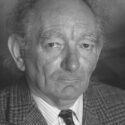Artist Profile
Brian Friel (1929 – 2015) was a playwright who explored social and political life in Ireland and Northern Ireland as he delved into family ties, communication and mythmaking as human needs, and the tangled relationships between narrative, history, and nationality.
Friel was educated at St. Patrick’s College, Maynooth (B.A., 1948), and St. Mary’s Training College (later St. Mary’s University College), Belfast (1949–50), and he taught school in Londonderry (Derry) for 10 years. After The New Yorker began regular publication of his stories, he turned to writing full-time in 1960, issuing short stories and radio and stage plays. After a six-month tutelage at the Tyrone Guthrie Theater in Minneapolis, Minnesota, U.S., in 1963, he wrote his first dramatic success, Philadelphia, Here I Come!, produced first at the Dublin Theatre Festival (1964) and subsequently appearing in New York City and London to critical and popular acclaim, receiving a Tony Award nomination for best play in 1966. It told of a young Irishman’s mood changes in contemplating emigrating from Ireland to America. Soon, Friel himself was settled in County Donegal, Ireland.
After writing The Loves of Cass McGuire, the Tony-nominated Lovers , Crystal and Fox , and The Mundy Scheme, Friel turned more to political themes, relating the dilemmas of Irish life and the troubles in Northern Ireland in such plays as The Freedom of the City, Volunteers , Living Quarters, and Making History. Other notable plays include Aristocrats , Translations , and Dancing at Lughnasa, which earned a Laurence Olivier Award (1991) and a Tony (1992) for best play. In Faith Healer and Molly Sweeney , Friel constructed plays consisting entirely of monologues. He also adapted the works of Anton Chekhov, to whom he was often compared, including Uncle Vanya, The Yalta Game, and The Bear.

